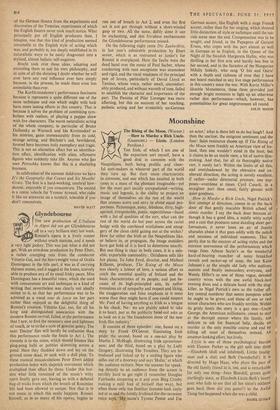Glyndebourne
tir.411A9 THE new production of L'Italiana in Alger! did not get Glyndebourne off to a very brilliant start last week. 4 - Rossini's opera is a lively runner without much stamina, and it needs
a very light jockey. This was just what it did not get. With an overdone production by Peter Ebert, a rather cramping rein from the conductor Vittorio Gui, and the heavyweight voice of Oralia Dominguez in the title part, it was as if carrying thirteen stones, and it sagged at the knees, scarcely able to produce any of its usual frisky paces. Miss Dominguez has a beautiful voice, which she used
with consummate art and technique in a kind of writing that nevertheless was clearly not ideally suited to it, so that her performance was to be admired as a vocal tour de force on her part rather than enjoyed as the delightful thing of Rossini's creation. Vittorio Gui, too, for all his long and distinguished association with the modern Rossini revival, failed, at the performance that I saw, to find the necessary ease and lightness of touch, or to strike a note of genuine gaiety. The next `Doctor' film will hardly be unfunnier than this performance made the finale to Act 1. The comedy is in the notes, which should bounce like ping-pong balls or pebbles skimming across a pond. Here they thudded down and lay on the ground stone dead, dr sank with a dull plop. To these musical miscalculations Peter Ebert added production laden with slapstick movement which multiplied their effect by three. Under this bur- den what little remained of the music's witty spirit finally gave out, leaving us with a deflated bag of tricks from which the breath of Rossinian life had been allowed to escape. Not that it is not music to which this easily happens. Rossini himself, as in so many of his operas, begins to
run out of breath in Act 2, and even the first act is not got through without a short-winded gasp or two. All the same, deftly done it can be enchanting, and this frivolous enchantment the Glyndebourne performance missed.
On the following night came Die Zauberflote, in last year's admirable production by Ebert senior, which is as restrained as junior's for Rossini is overplayed. Here the faults were the dead hand over the music of Paul Sacher, whose conducting with rare exceptions was somnolent and rigid, and the vocal weakness of the principal pair of lovers, particularly of David Lloyd as Tamino, whose voice, rather small, uncomfort- ably produced, and without warmth of tone, failed to establish the character and importance of the part. The Pamina of Pilar Eorengar was more affecting, but this on account of her touching, pathetic acting and her irresistibly un-German German accent, like English with a stage Frenct accent, rather than for her singing, which showec little distinction of style or technique until the sui. cide scene near the end. Compensation was to be sought, and found, in the Papageno of Geraini Evans, who copes with the part almost as well in German as in English, in the Queen of the Night of the Swedish Margareta Hallin, who was thrilling in her first aria and hardly less fine in her second, and in the Sarastro of the Hungarian Mihaly Szekely, who sang '0 Isis and Osiris with a depth and richness of tone that I have not heard matched in any live stage performance in this country since the war. With Kevin Miller's likeable Monostatos, these three provided just enough bright moments to light up an otherwise rather dim performance—which, however, has potentialities for great improvement all round.
COLIN MASON


































 Previous page
Previous page